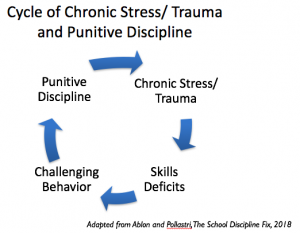31 Public School Disciplinary Action: by Quin
[Public School Disciplinary Action]
Organizational Imagination and Metaphorical Analysis
Quin Mumford
12/8/21
Key Words: High School, Disciplinary Action, Student Misconduct, Psychological Effect
Introduction: Disciplinary methods currently widely used around the United States serve no purpose of rehabilitation and only harm the students involved. The current methods used only serve the purpose of removing “problematic” students from an environment that should be fostering knowledge. These disciplinary actions have been proven to send students into spirals of deeper behavioral issues that only feed larger societal institutions later on in their lives. What I want to do is outline the systemic issues that schools face by implementing harsh disciplinary action through the lens of our organizational metaphors, and propose an alternative solution that is inclusive and equitable.
Setting the Scene: The Cyclic System of Failure

Figure 1: This flowchart diagrams the cyclic psychological and sociological trauma and skill deficit that comes as a byproduct of inequitable childhood disciplinary actions. Punitive discipline harms students and allows their deficiencies to fester and progress into larger outbursts, causing more unwarranted disciplinary actions. Taken from Psychology today.
What really troubles me about this flowchart is that there are hundreds of iterations of this diagram to choose from. A large majority of psychologists studying childhood development and behavioral patterns have identified this cyclic pattern as problematic, yet the American School system has yet to do anything regarding the standard of discipline. Impeding a child’s normal day to day over a small incident has long term psychological effects, posing no risk to upper level administration. Essentially this environment only serves as a medium to remove problematic students from the classroom while neglecting the care that every child should be entitled to within education.
The current system of classroom removal is a massive source of this perpetual trauma. Methods of suspension, detention, and removal are all used for the sake of the educators. Punitive punishment that removes students from educational environments, only isolates students from academic and social engagement. Reflecting more on my highschool experience, this was an especially large issue within the special needs education program. Misbehaving neurodivergent students are locked in a sensory room until their outburst subsides. While this may seem normal for the general public and the educators that allow this punishment to occur, the psychological ramifications that come with this punishment are beyond horrifying. In my intro psych class we spent a week deconstructing this punitive punishment, and found multiple research articles about how this method of isolation only propagates outburst behavior and does nothing to assist the student in distress. My senior year of highschool I spent time assisting the special education teachers just as an assistant for their day to day operations. When assisting students there was never any incentive to develop themselves, just the end goal of graduation and working within the program my school had as a pipeline for these students to enter the workforce. Students would have their outbursts and in these times of crisis, they were just thrown into a sensory room until they “cool down”. There is never any incentive to reflect on actions, granted this was a unique case, but still the students in distress were just thrown to the side until the issue subsided. This is the status quo for all students across the nation, no rehabilitation or reflection only short term solutions.
Metaphorical Analysis:
When contemplating the metaphors that play a large role in this system, Domination, Machine and Psychic Prison all come to mind. Domination exists at the core level of scholastic control. The American educational system relies heavily on domination and control of students day to day life. Absences are met with more absences via suspensions and detentions, and students are expected to be in attendance no matter the circumstance. The student is never prioritized, and only acknowledged when there needs to be disciplinary action. Psychic prison is also very prevalent in this system as students become demoralized and trapped in a cyclic system that preys upon them. Students are left to miss out on educational experiences causing more deviance warranting more and harsher action to be taken. The emotional toll that this takes only locks students into a systematic method of thinking, “this isn’t so bad, so why even care?” No incentive is ever given to the students to change their methods of thinking, nor incentivize educational prowess. Finally, Machine; The mechanistic cycle of keeping punishment the same and not incentivizing the students to change their methods and reflect upon their choices. Free will is not an option in the American education system, and everything is dedicated by administrators. No student is ever prioritized and the power dynamics at work only serve faculty. Every student is a cog in this mechanistic cycle of educational domination.
A Path Forward:
Reform is absolutely necessary for this punishment system. Breaking the psychic prison that holds students within a system that does not care about them needs to occur. Transforming educational norms that have only preyed upon students of color, neurodivergent, and behavioral distressed students. The normalization of power over students needs to stop, teachers and administrators need to prioritize the individual and the ideas that each student can contribute to the space of knowledge. Finally the current american education system needs to begin to identify the importance of mental health and the variety that each student holds. What can be done to accomplish this? Abolish punitive punishment. Students need to understand that they are valuable to any space they enter, and the current system does not support this way of thinking. By caring about individuals, society can only improve, as every person holds value that the American education system fails to recognize.
Works Cited:
Psychology today “Is school discipline guilty?” https://www.psychologytoday.com/us/blog/changeable/201810/is-school-discipline-guilty
